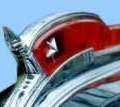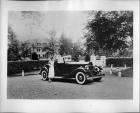|
Now if this could be used to make Packard parts
|
||||
|---|---|---|---|---|
|
Home away from home

|
Posted on: 2011/8/1 16:34
|
|||
|
||||
|
Re: Now if this could be used to make Packard parts
|
||||
|---|---|---|---|---|
|
Forum Ambassador

|
this makes me giddy! weeeeeeee!!!!
Posted on: 2011/8/1 16:40
|
|||
|
1937 Packard 138-CD Deluxe Touring Limousine
Maroon/Black 1090-1021 [url=https://packardinfo.com/xoops/html/modules/registry/View.php?ID=232]1955 Packard |
||||
|
||||
|
Re: Now if this could be used to make Packard parts
|
||||
|---|---|---|---|---|
|
Home away from home
|
On one program, Jay Leno talked about scanning a water pump from an antique automobile, then loading the file into the printer and printing parts that were used as patterns for molds to make a new pump. The earlier versions of these 3D printers used thin paper as the medium. This is far beyond those early printers.
(o{}o)
Posted on: 2011/8/1 17:23
|
|||
|
We move toward
And make happen What occupies our mind... (W. Scherer) |
||||
|
||||
|
Re: Now if this could be used to make Packard parts
|
||||
|---|---|---|---|---|
|
Home away from home

|
This is one of the things I do for a living working at a OEM auto manufacturer. When a scan is done with lets say using a white light scanner. ATOS is one kind I use. you get a CAD file. Although you just can't print it out on a 3D printer and use it for a pattern, There is a shrink factor that must be applied to the model before hand or the part becomes further from the original. I use CATIA to do that. I actually had a tool come off a 3D printer this morning, Although it was a model I made from scratch. If I was rich I would do that to many Packard parts I have thought of like the windshield for a 37 115/120 convertible. Dreaming now. It is fun stuff to do when I get inside the computer and I can stay all day creating. Unfortuantly its for new cars, I can not use it on my Packards............. dang why was a born to poor parents....
Posted on: 2011/8/1 19:22
|
|||
|
1936 and 1937 120's Are what we like best. But we also like all other Packards too.
Don 37' |
||||
|
||||
|
Re: Now if this could be used to make Packard parts
|
||||
|---|---|---|---|---|
|
Forum Ambassador
|
If private individuals, albeit well heeled ones like Jay Leno can afford to buy or lease then these systems apparently have come down considerably in price. Enough so that it would seem there should be a few entrepreneurial types or vendors starting to offer the service for unobtainium parts.
With the economy, there should be casting shops that would accept a premade core and machine shops with some automated equipment with idle time looking for a little extra business that would accept standard CAD/CAM programs. Even a one or two off should be profitable with a premade core or program. Lehigh compressor valves, standard shift linkage bushings, a few minor little things like that. EDIT: I'm surprise to learn the shrinkage factor isn't part of the output program but even that should be able to be factored in.
Posted on: 2011/8/1 19:24
|
|||
|
Howard
|
||||
|
||||
|
Re: Now if this could be used to make Packard parts
|
||||
|---|---|---|---|---|
|
Just can't stay away
|
Hi,
Actually, though Jay is "well heeled" this machine is not that expensive. I saw that video about a year ago, so I didn't watch it this time; however, if memory serves, that machine costs less than $5K. It's kind of wondrous and it's kind of sad at the same time. As a young man, I worked as a mechanic for a short time in a huge foundry in Connecticut and I used to marvel at the intricate patterns made out of wood in the pattern shop there. One of these machines can probably put a whole shop full of old time pattern makers out of work by producing patterns in a fraction of the time it takes to fabricate them by hand. If you're a machine shop that specializes in recreating parts for classoc cars and you need something to create accurate patterns to work from, that machine is a very good investment. In fact, it would probably be a good investment for a club. Members could replicate the part they need in 3D and then turn it over to a machine shop/forge so that the machine shop could use that pattern to exactly recreate the part needed. Have you ever watched that Discovery Channel show, American Chopper? They have a water jet milling machine that can cut very intricate parts out of solid metal using only water and a computerized pattern keyed into the machine. Imagine coupling this technology to something like that! Mike O'Handley Kenmore, WA
Posted on: 2011/8/4 19:59
|
|||
|
||||
|
Re: Now if this could be used to make Packard parts
|
||||
|---|---|---|---|---|
|
Home away from home

|
There are service companies that own these machines and rent the usage by the hour. This is not pie in the sky, however when you get done with making some parts in small quantity it is very expensive. If it were cheap there would be many more parts made for Packards etc
Posted on: 2011/8/4 20:12
|
|||
|
||||
|
Re: Now if this could be used to make Packard parts
|
||||
|---|---|---|---|---|
|
Forum Ambassador
|
Quote:
Totally agree. Didn't realize the machines had come down in price that much but even more the opportunity--although the cost of the software and 3D laser scanner should up the ante still. I have seen the battling Teutul's show and their machinery. That type of cutting machine was one of the reasons I thought Lehigh compressor reed valves could be made so easily after being scanned in. Maybe I'm wrong but thought the real expense part of any work like that was the time involved in doing the CAD drawing and amortizing the drafting. With a scanner in the process doing the heavy lifting, would think the remainder should be negligible. Fine tuning the program or pattern, then sending it to a machine or casting shop. Price of the material, time needed for someone to mount it in the machine or fill the sand flasks and the profit. While not cheap, I wouldn't think that should require 3000 copies or a down payment on the national debt.
Posted on: 2011/8/4 20:19
|
|||
|
Howard
|
||||
|
||||
|
Re: Now if this could be used to make Packard parts
|
||||
|---|---|---|---|---|
|
Home away from home

|
How good that Donald (Don 37) mentioned a shrink factor. Now, after the first speechlessness is gone it is time for a bit sobriety. I don't believe in miracles. How to scan winding inner holes? How about two component (copper sulfated tungsten filaments) or multi component parts (ignition plugs)? How much is it to create the often necessary physical properties like mass (flywheels), thermical resilience (valves), tensile strength (piston rods), abrasion characteristics (big end bearing shells), electric conductivity (stators), degree of hardening (piston pins) and dry running capability (bearing rings)? How reliable works a software added spring characteristic (valve springs)? Where to download insulation properties or damping factors? How flexible is printed flexibility? Will wire printers learn to stich frost resistance into printed cast iron? Do you belive in magnetizing apps, a virtual surface quality and emulated noise radiation? ...
Will it be possible to press a bearing in a printed pump impeller? What is a suitable alternative for the gold foil on the Caribbean lettering? Acidic yellow Chinese plastics? 3D-printers are a mold-breaking innovation but they aren't Packard replicators. BTW Howard, I always thought that Mr. Leno is wheel heeled. <iframe width="425" height="349" src="http://www.youtube.com/embed/qD4EVXkfe0w" frameborder="0" allowfullscreen></iframe>
Posted on: 2011/8/5 0:43
|
|||
|
The story of ZIS-110, ZIS-115, ZIL-111 & Chaika GAZ-13 on www.guscha.de
|
||||
|
||||








